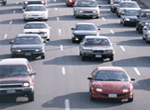Would you begin your commute earlier if you had a chance of winning up to an extra $50 in your paycheck?
That question formed the basis of an interesting story in the New York Times this week. Researchers at Stanford University are conducting a driver incentive experiment aimed at seeing whether peak-period traffic congestion around campus can be reduced. The project, called Capri, for Congestion and Parking Relief Incentives, lets regular university commuters who enter or leave the main Stanford campus via designated exits at off-peak hours (an hour before or after 8am to 9am and 5pm to 6pm on weekdays) sign up to be entered into a lottery. The more times a commuter drives during the off-peak hours, the greater the reward. In addition, a commuter can designate a “boost day”: if the driver makes “an extra effort to travel at off-peak times on that day” he or she will triple their potential reward. Alternatively, a commuter can choose to be paid 10 cents per eligible trip if they don’t want to enter the lottery.
Participants in the program can have a small RFID tag attached to their windshields to track their entry and departure times, although the Times story indicates that a driver can opt to have the tracking conducted through the his or her smart phone.
It turns out that by getting just a small number of commuters to change their driving patterns, peak-period traffic congestion can be reduced significantly. The objective is to get some 10 percent of Stanford University commuters to avoid peak commute times. The project has been so successful in the early going that Stanford's underused parking lots will soon be the focus of a similar incentive program meant to encourage their use.
Stanford University electrical engineering and computer science professor Balaji Prabhakar came up with this approach to incentives to change driver behavior as an alternative to proposed disincentives such as congestion charges which most people hate, the Times says. Prabhakar, who hit upon the idea of incentives while sitting in a massive traffic jam in Bangalore, India, a few years ago, has run successful trials in Bangalore (pdf) and Singapore that bore out the effectiveness of the incentive approach.
The Stanford experiment is being supported by a $3 million grant from the US Department of Transportation.
So, would you leave for work an hour earlier or depart an hour later for the chance of winning $50? And how long would it take—assuming you never won anything—for you say to heck with it? Would the possibility of earning a guaranteed $1 a week still be enough to change your behavior, or would the benefit of a faster commute be incentive enough?
Robert N. Charette is a Contributing Editor to IEEE Spectrum and an acknowledged international authority on information technology and systems risk management. A self-described “risk ecologist,” he is interested in the intersections of business, political, technological, and societal risks. Charette is an award-winning author of multiple books and numerous articles on the subjects of risk management, project and program management, innovation, and entrepreneurship. A Life Senior Member of the IEEE, Charette was a recipient of the IEEE Computer Society’s Golden Core Award in 2008.



